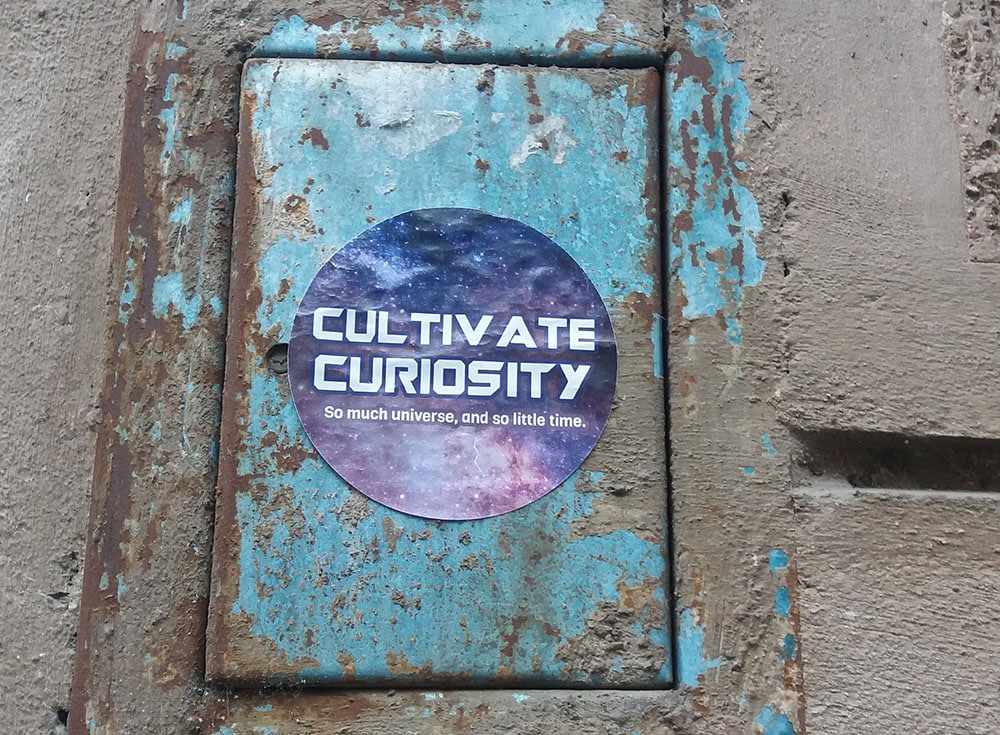
Abraham Lincoln and my granddaughter Emma have gotten me curious about Jesus. More specifically, curious about Jesus’ curiosity.
It started when I was reading a review of a new biography that noted that Lincoln’s closest friends and associates « recalled him as a man of boundless curiosity for whom ‘life was a school.’ «
That reminded me of Emma. She’s just turning 4, and she’s always been filled with an inexhaustible desire to take in and understand — to touch and feel and experience — this world she’s found herself born into.
When she was 2, we were at the park one day, she and I, and she was riding on a swing, an activity she delighted in. From her perch on the moving swing, she spent the time looking all around her: at the street nearby, where she’d note every truck passing; at the slide where the older kids were playing; through the buildings where she could glimpse elevated trains on their way to or from Chicago’s Loop; at every doggie — « goggie » — she could spot.
Emma was taking it all in and relishing the fun of putting together all these pieces of life into patterns and arrangements to comprehend how this connects with that, how these are like those and more important, her own place in this place called Earth.
Curiosity is a hallmark of humanity. Even so, I’ve known people who weren’t very curious, people going through life with blinders on. That strikes me as a narrow way of living.
When I think of the saints, official and unofficial, I have the sense that they were as open to the fullness of life as Emma has always been, as Lincoln once was — Francis of Assisi, Dorothy Day, Martin de Porres, Dietrich Bonhoeffer, Teresa of Avila, Thérèse of Lisieux, to name a few. They woke up every day with fresh eyes, eyes hungry for the world God created — and for the people in this world, all the people, old and young, poor and rich.
I’m no mystic, but I try to be as open to life as I can be. And that’s how I picture Jesus.
Remember the story in Luke’s Gospel about how, when Jesus was 12, his family visited the Temple in Jerusalem? When Joseph and Mary headed back to Nazareth, the boy, unknown to them, stayed behind and spent at least three days with the teachers there, sitting in their midst, « listening to them and asking them questions. »
I think this story (Luke 2:41-52) is usually used to show that Jesus already knew a lot at that age, and I’m sure there’s something to that. But for me, it’s more a story of the boy’s curiosity. He was, like Lincoln, hungry for « every morsel of human existence. »
Consider the parable Jesus tells about the mustard seed (Matthew 13:31-32). As I picture it, he’s sitting there and maybe holding one of those tiny seeds when he says, « The kingdom of heaven is like a mustard seed that a person took and sowed in a field. It is the smallest of seeds, yet when full-grown it is the largest of plants. »
How does Jesus know about mustard seeds? He’s a carpenter after all, not a farmer. And how does he know what happens, as he relates in another parable, when seeds are sown on different types of soil?
The answer is his curiosity. I imagine him listening to farmers grousing about trying to plant seeds in rocky ground. I imagine him, at some time well before he told this parable, pondering a mustard seed in his hand and marveling — enjoying the thrill of realizing — that it explodes, in the slow motion of nature, into a huge tree.
He’s open to revelation from the smallest of God’s creation, and to people of all sorts — even those who were outcasts in his Jewish culture.
This openness of heart and mind that Jesus models is a key element of curiosity. My granddaughter will never learn anything if she isn’t open to learning.
Jesus was a human being who had to learn about life, just as Emma is learning — and the learning didn’t stop in childhood. Even as an adult, he maintained this openness, this profound curiosity.
Picture Jesus at the wedding feast at Cana, for instance. I see a single guy in his early 30s who is intensely interested in all that he sees, hears and smells. He takes in the feel of the party, its rhythm, the mood of the people who are dancing, the emotions on the faces of those men and women along the wall. He is alive to all that is around him, including, with a nudge from his mother, the dwindling wine supply. He is attentive, curious.
Or consider Jesus on the cross: Amid the suffering, dejection and the knowledge of his approaching death, he looks out and gazes at faces he loves. He sees his mother, the other women and John the beloved disciple there. He looks among the crowd, noting the variety of emotions and positions.
Even in dying, Jesus is intensely alive, observant of what is happening around him. What is the point of becoming human if not to be fully present to all life brings, even death?
Jesus walked through life with his eyes wide open — and faced his death with the same wide eyes. As his follower, I am called to the same intense engagement with the world and its people, called to share the curiosity of Christ.



